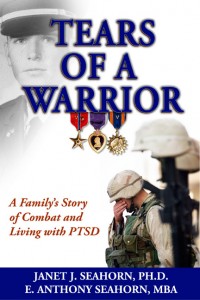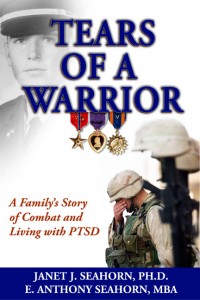Mar
15
“Tears of a Warrior” eBook
Filed Under eBook, Events, PTSD, Tears of a Warrior, Today's War | Comments Off on “Tears of a Warrior” eBook
by Tony & Janet Seahorn
Mar
12
EXPLAINING PTSD IN A VIDEO
Filed Under Combat PTSD, PTSD, PTSD treatment, TBI & PTSD, Tears of a Warrior, Trauma, Veterans | Comments Off on EXPLAINING PTSD IN A VIDEO
by Janet J. Seahorn, Ph.D
For centuries societies have been trying to explain why warriors return from combat “stranger” than before they had left. In our book, Tears of a Warrior, we wrote about how the Roman’s sent their troops who had recently arrived back from battle to a tranquil farm away from the city to recoup from their emotional wounds.
It seems like every war had its own special term for such suffering; words such as combat fatigue, shell shock, warrior’s heart, etc. However, none of these really explained much about why the individual wasn’t able to put the war behind them and get on with their lives.
Joe Novak, another of our readers sent this YouTube video to Tony. For the person who has never experienced combat, this will be an informative eight minute clip which both “shows” and “tells” the effects of battle. For those who have been to hell and back, you may not need to view the film; you have already lived it. If you do, keep the last message in mind as you continue your healing journey back to your new normal.
http://www.greatamericans.com/video/Vietnam-Vets-and-PTSD;Veterans-Videos
Blessings and, once again, Thank You for Your Service.
Tony and Jan Seahorn
Both KINDLE & NOOK can be ordered directly from our website.
Jan
10
THE MAN I DIDN’T KNOW
Filed Under Combat PTSD, Family, PTSD, Tears of a Warrior, The Man I Didn't Know, Veterans, Vietnam Veterans, War | Comments Off on THE MAN I DIDN’T KNOW
by Janet J. Seahorn, Ph.D
This is the title of a book sent to us by Marie Leduc, the wife of a Vietnam Veteran who co-wrote it with retired naval aviator, Art Schmitt, Ph.D. Later Art got his degree in psychology. The Man I Didn’t Know: The Stories of Wives and Families of Vietnam Veterans who suffer from “Post Traumatic Stress Disorder”, is a collection of stories and poems written from the perspective of those most directly impacted by combat.
The articles are heartrending and the poetry will literally place you in the hearts and souls of the writers. While reading through the many tales I found several statements pretty sobering and thought provoking. Some statements gave me an unusual viewpoint of war, especially the last few wars we have fought and left without a clear victory. I have included several small snippets of some of these in this blog.
- “The United States did not lose the war in Vietnam, the South Vietnamese did. The last American troops left Vietnam on March 29, 1973, (however, the last flight out wasn’t until 1975). We did not lose the war… we stopped fighting” (p. 16). Recently, December 15, 2011 we raised the last American flag as we leftIraq. I wondered if years down the road we will describe this last conflict in a similar manner.
- “There are two kinds of PTSD… acute, which is treatable, and Chronic, which is manageable”. More Vietnam veterans, per capita, suffer from chronic PTSD than from any other war. The reasons for this is unknown, but it may be that it was an unpopular war and the veterans were not welcomed home” (p. 16).
- In another article, To Answer Your Question, by Ed Ruminski, the veteran is trying to explain to his son what combat was like, how time stopped and actions were both quick and in slow motion. How he had to be “constantly watching, listening to my senses”. In the end he merely states, “They call it war, and to answer your question son, yes, I have killed somebody. What I was unaware of was how by that process I just described, I was also killing myself” (p.19). Sadly, many of our Iraq and Afghanistan troops are returning with parallel sentiments.
 These are just a few statements from the book. The various writings describe the wounds of the minds, how scary it can be for a family to negotiate the many behaviors and emotional ups and downs of their beloved warrior, how a mother must learn to cope with the death of her son while visiting the Vietnam Wall to stay connected, and how PTSD affects children when their under developed minds and bodies leave them vulnerable to actions which they may never fully understand. In the end, this last quote by Jacqueline McVicar (p. 85) really says it all.
These are just a few statements from the book. The various writings describe the wounds of the minds, how scary it can be for a family to negotiate the many behaviors and emotional ups and downs of their beloved warrior, how a mother must learn to cope with the death of her son while visiting the Vietnam Wall to stay connected, and how PTSD affects children when their under developed minds and bodies leave them vulnerable to actions which they may never fully understand. In the end, this last quote by Jacqueline McVicar (p. 85) really says it all.
“His fight was in Vietnam,
Ours is the Vietnam in him.”
Ordering information: ISBN: 1-4196-2452-0 www.booksurge.com 1-866-308-6235
Nov
1
Tribute To A Soldier
Filed Under Combat PTSD, Presidential Unit Award, PTSD, Tears of a Warrior, Tribute, Troops, Veterans, War, World War II | Comments Off on Tribute To A Soldier
by Deborah A Maffucci
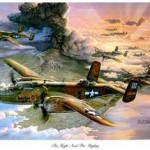 This blog was sent via an e-mail letter last week. Deborah has kindly allowed us to share her comments with our readers.
This blog was sent via an e-mail letter last week. Deborah has kindly allowed us to share her comments with our readers.
Growing up, my knowledge of my dad’s war experience went no further than, “My dad was in WW II and I think he was stationed in England.”
On advice from my therapist, I decided to go to the attic and find my dad’s discharge papers. Oh my!!! After hours of online research (which is amazingly complete) for the first time I realized that my dad was right in the “thick of WWII”
He was 22 years old in 1942 when he joined the USAAF to fight in the European Theatre in WW II. He received four medals and a Presidential Unit Citation. He was at Normandy, the Battle of the Bulge and Rhineland. He was a Technical Sgt. in the 8th Air Force Fighter Command, 66th Fighter Wing, 339th Fighter Group, 504th Fighting Squadron. Oh my stars !!! He was a soldier.
I needed to read about what it is really like to be a soldier. I found your book, “Tears of a Warrior” at my local library and read it almost in one sitting. I couldn’t put it down. A whole world of understanding and compassion for my dad has been felt in my heart. A sense of awakening and belief that I will feel much more true joy and happiness and conquer my life long feelings of anxiety, fear and depression.
I realize now that I am trying to heal from the secondary PTSD that comes from living with a combat warrior and not knowing it. There was no time for my dad to heal because he died in 1969 from cancer. I realize my dad’s war experiences must have been the true source of our family struggle. It wasn’t because my dad didn’t love us, or because he would rather spend all his time at the firehouse, the VFW or the Elks Club, he was a warrior. I understand why he loved being a fireman, he was draw to the danger, why he abused alcohol, to block out his war memories, why he yelled so much, he was a sergeant. All my childhood memories make sense now. Your book has put my life story in prospective. Thank you for that long awaited insight. !!!
My dad was a combat warrior and I never knew it. I just want to give him the biggest hug right now and tell him how proud I am of him. From 1945 until Dec 7th 1969 when he died, he was fighting WWII in his mind and body.
You have truly helped me to understand what happened to my dad in the war and what he must have struggled with after the war. I hold him in a new and special place in my heart.
God bless you,
Debbie Maffucci
P.S. I borrowed your book from the Jesup Library in Bar Harbor, Maine. I believe it was only hours after you so graciously donated a copy to our town. I have recommended it to my counselor to use in her therapy work.
Aug
22
HEALING REUNIONS
Filed Under Events, Healing, Life, PTSD, Tears of a Warrior | Comments Off on HEALING REUNIONS
by Tony & Janet Seahorn
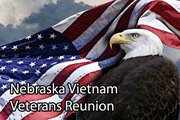
The corn is high, tasseled and almost ready to cut. Traveling through Nebraska we pass miles and miles of these tall stalks waving in the wind and looking like a legion of green sentries welcoming visitors. For the second year in a row we are returning to the Nebraska Vietnam Veteran Annual Reunion as guest speakers. It is the twenty-seventh year the gathering has been held and the attendees grow each time. Every person is welcomed… veterans, spouses, family members, and friends. Besides Nebraska, they travel from South Dakota, Kansas, Wyoming, and Colorado.

These reunions are not just reminiscing about the vet’s combat experience. They are more on being with others who have traveled a familiar road, have endured a similar past, and have formed new friendships, gained new understandings of their war events, and lived a life of service to their families and communities. The days are filled with celebrations of being – being with old buddies and new friends, being with other spouses to laugh and cry, and being in their beloved state to appreciate that this land is exactly what they fought, died, and suffered for decades earlier. Since they had no parades or welcoming ceremonies when they returned from Vietnam, they created their own event commemorating their service.
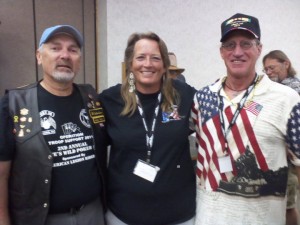 Hanging around over four hundred veterans and their families, one observes and learns many lessons and here are just a few:
Hanging around over four hundred veterans and their families, one observes and learns many lessons and here are just a few:
- 1. There really is healing in numbers.
- 2. One does not have to do the journey after combat alone. He/she has a huge posse to support the trip.
- If one person falls, there are many who care enough to pick him up, brush him off, and kick him in the butt to keep going.
- The pain and memories of combat may never go away but these memories/pain do not have to consume the entire life of the individual. Each person must make the choice to move forward in spite of their wounds.
- There is still joy in living each day.
- Laughter (and food) really is the best medicine.
- A good sense of humor gets you through a lot of grief.
And last, this special quote that we used during our workshop to support each vet and their family’s continued healing.
“The key thing to get inside the head of a PTSD suffering vet is this: If one of your buddies was lying wounded on the battlefield, you’d carry him to safety at all costs, right? Well this time, the vet wounded in his soul is the guy in the mirror, AND IT’S YOUR DUTY to carry this one more vet to help. He’s hurting because he’s a human that’s gone through an inhuman experience. Your buddies who didn’t make it back want one thing only – for one of you to make it, namely YOU. Your victory is saving that vet in the mirror, helping him forgive himself for being only human ( Roland Van Deusen).”
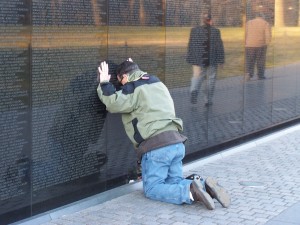
Jul
26
PERSONAL FORGIVING
Filed Under Combat PTSD, Family, Giving, Healing, Life, PTSD, Trauma | Comments Off on PERSONAL FORGIVING
by Janet J. Seahorn, Ph.D

There is a saying in the bible stating, “Forgive and ye shall be forgiven”. Yet, here’s the dicey part for many of us, some times it is harder to forgive ourselves for things we have and have not done (some of which are more perception than truth) than it is to forgive others.
Military men and women who serve in intense combat zones must learn to identify and face up to their experiences from their emotional position if they are to begin to heal. Putting “these feelings into words or some other symbolic expression”, as Bessel van der Kolk asserts, helps complete the story in a restorative manner. Everyone has things they have done that they wish could be forgotten. The problem occurs when we can’t just forget, or the personal blame continues to grow. The burden gets heavier unless some of the weight is released. We cannot be set free until we understand that we’re not fully responsible for much of the trauma that took place in our lives.
As humans, many of us tend to take too much ownership for circumstances that are far beyond our full control. We simply do the best we can, and sometimes that “best” does not feel good enough. Forgiving ourselves is an important step in the healing process. Without personal forgiveness, we hold too much anger, sadness, and anguish in our minds and bodies. It is little wonder we become emotional and physically drained.
Realistically, I do not condone the open spilling of our feelings. Sometimes when I have been overly urged to do so, I left the exchange even more vulnerable and irritated. And I definitely did not want to be in the presence of that person anytime soon. It is only when we can begin to share with someone who is open to listening and able to keep our words in confidentiality can we feel safe enough to share our story. Trust is crucial. Patience is necessary. Hope for living a better life is essential.
Daniel Siegel writes about the importance of “feeling felt” when sharing emotions. We cannot “feel felt” if, when sharing our stories, we are constantly being interrupted, interrogated for more details, or given advice on how we should or should not have acted or felt. Such disruptions only validate our instincts to suffer in silence. Unfortunately, unspoken suffering only compounds the problem and adds to the burden.
The challenge is finding the right person (or people) at the right time to begin your dialogue. For many of us it may or may not be a close family member or friend. Sometimes talking to a reliable “stranger” can bring clarity to our experience.
Begin to explore who may be your safe sounding board. In doing so, the weight of your story may begin to diminish. You may just realize that carrying this burden is no longer helpful or necessary. Free yourself of the guilt. Free yourself of the pain. Free yourself of a past that can now be accepted, learned from, and honored.
You deserve no less as you live towards that healing place in your mind, heart, and body.
Jul
19
HEALING DAD
Filed Under Combat PTSD, Healing, PTSD, PTSD treatment, Tears of a Warrior, War | Comments Off on HEALING DAD
by Janet J. Seahorn, Ph.D

It was Father’s Day and I got to thinking about all of the vets who are fathers and all of the special moments we shared as a family, as well as the times when things weren’t all that peaceful. In our book, Tears of a Warrior, we wrote that the good things far out numbered the bad. Yet, those difficult periods left lasting wounds; wounds that still remind us of the challenges of living with Post Traumatic Stress. Healing the wounds within us and the wounds inflicted on our loved ones can be a life long endeavor – a journey that poses some questions in order to mend the injuries.
First, identify who has been wounded and who do you need to help heal, besides yourself? Which relationships have been most broken by past and/or present actions? These can be spouses, children, siblings, parents, friends, and even co-workers. Identifying your “wounded group” will require a great deal of personal self-reflection and honesty. Not something most of us humans do well. Root-canals are easier to endure than admitting we have verbally harmed someone we care about due our unhealthy behavior.
What exactly needs healing? Things like trust wounds, word wounds, responsibility wounds. What actions impaired the ability of others to trust us? What did we do that makes us question if we can trust ourselves? When have we used words to inflict hurt? Interesting things – words; they can leave wounds that are longer lasting and harder to forget or forgive than many bodily injuries. Unlike physical bruises which can be seen on the outside of our bodies, words bruise the heart in ways that can neither be seen nor easily healed.
If you have been able to get this far, the difficult question of How can I mend these wounds? emerges. It isn’t important to do something huge; start with something simple which may not be all that easy. A phone call, a letter – personally I like Hallmark cards or even the new internet e-cards can be the beginning of saying I’m sorry, or Forgive Me. PTSD has been a bit like the words Jesus used on the cross, “forgive them for they know not what they do”. Because we did not know better, it was hard to do better. Most of us had no idea what PTSD was or how living through war left the veteran with residue that impacted his/her actions for years to come. Now we can get better by knowing more about the demons of combat.
Healing others helps us heal ourselves. It is a way of living forward with hope and personal forgiveness. It may be the only way we can diminish some of the demons allowing us to lead a more productive and peaceful life. Don’t wait another day to give yourself this belated Father’s Day gift. Some who have been wounded by our actions may not be ready or able to give forgiveness. This will be their journey. You can’t force forgiveness, nor can you take responsibility for it once you have assumed ownership of your own past actions. Take a deep breath, make that first step and conquer your fears and procrastinations.
“You may be disappointed if you fail, but you are doomed if you don’t try” (William Shakespeare).
Jul
11
NOW THIS IS RESILIENCE
Filed Under Combat PTSD, Life, PTSD, Tears of a Warrior, War | Comments Off on NOW THIS IS RESILIENCE
by Janet J. Seahorn, Ph.D
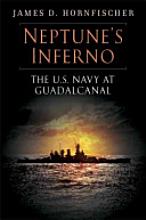
This is just one story of one veteran who served in World War II. We received it in a letter from a man who is approaching “89 years young”, as he proudly put it. His name is John and he wrote he has “good genes” and is of Irish and French Basque decent. What was so endearing about this letter is that it was type written, well some of it. Halfway through the letter his typewriter tape went out and he had to continue his story handwritten. The picture of this “young” man sitting at his old typewriter skillfully creating his message is really quite precious.
John’s story is much like countless military veterans. Part of his tale is chronicled in a book by James D. Hornfishcher, Neptune‘s Inferno – the U.S. Navy at Guadalcanal. This particular battle claimed the life of the first two WWII Navy Admirals killed during combat. Because his ship was in enemy territory being stalked by submarines, the rescue ship had to “put him in a metal basket, slung over the side on a long line to a destroyer”. From there he was transported to Fiji for several months of hospitalization. Eventually, John arrived back to the states where he spent over a year in rehab. But this was not the end of his healing journey. After leaving the hospital he was sent to another place in Yosemite National Park which served as a holding location for vets waiting for their discharge papers. Since there was no PTSD ward at the time, John explained, that he was “placed into a long, one room barracks building which was called the All-Messed-Up Ward”.
When John was injured, he was paralyzed on the entire right side of his body. He could not hear well nor speak much, which he humorously stated “much to the pleasure of the other patients… who wants to hear a US Marine Sergeant yak-yak”. His leg was severely injured along with loss of part of his skull. Due to his head injury he suffered many years with epileptic seizures. John admits he has struggled with PTSD (as has his brother who also served in the Marine Corp). Yet, throughout his letter there was a theme of humor, courage, and resilience. This combination of personal moral fiber aided him in living a full life.
One of the last things John wrote, I’m doing quite well, reminded me of the remarkable valor and stamina the vast majority of veterans possess. John wrote to thank us for our book, Tears of a Warrior. He said it helped explain some of what he went through during and after the war. In the end it is we who are honored to hear from someone who has endured so much, given so much in service to his country, and still continues to live with enthusiasm and pride.
Tony and I are deeply humbled to hear from individuals like John. It made those long years and challenges of writing our book worth the time and effort. And we continue to hope and believe that for everyone who has been wounded in any way during service to our country that If we send them, then we must mend them – no matter how long it takes or how much it costs.
John’s life is a testimonial to all of our military heroes.
Jun
25
GOOD GRIEF
Filed Under Combat PTSD, Good Grief, Life, PTSD, Tears of a Warrior, Trauma, Veterans, War | Comments Off on GOOD GRIEF
by Janet J. Seahorn, Ph.D
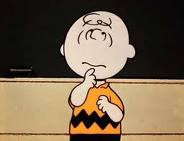
Good Grief – sounds like words Charlie Brown would proclaim when something illogical occurred. When you think about it, he was not that off base using this phrase, Good Grief, because grief, at least the first phase of mourning, is anything but logical. Experiencing grief is not a rational process. It is gut wrenching and emotionally challenging. Grief by its very definition: “deep sadness or mental distress caused by loss, remorse, or bereavement” (Webster’s Dictionary) leaves the sufferer questioning if he/she will or can survive the agony.
Too many of our military men and women have had to bear the loss of friends. Yet, due to circumstances of the battlefield, they cannot take the time, energy, or effort to fully move through the grieving process. Each individual must be able to carry on without the luxury of grieving. In war, there is always another job to do, a new battle to wage, and perhaps even further loss. Add PTSD to the grief process, and the mountain to healing becomes even steeper to climb.
It is little wonder that our young and old warriors return from combat with unresolved issues. Many of these problems center around the grief process or more accurately, lack of resolving the immense weight of unsettled pain. If we were to look at the grief process described by Elizabeth Kubler-Ross’ five stages – denial, anger, bargaining, depression, and finally acceptance – it is pretty easy to identify where & why many can get permanently stuck in one phase or another. To complicate matters, real grief processing requires going in and out of the various stages for a long period, often times skipping phases only to be plunged back to that pit at a moments notice.
Families of vets often state that their loved one is in denial; denial that they are suffering, denial that there is anything wrong with them, and denial that they can handle the situation without help. Then there is anger; anger at the government who sent them to fight, anger at the enemy, anger at a civilian society that has no clue of what they went through, and most devastating is anger at themselves for not being strong enough to overcome the trauma of combat. As far as bargaining, most warriors don’t seem to bargain for much of anything except for a break to live without all of the emotional baggage.
What we see a great deal of, when and if a veteran reaches this next phase is depression. This is the phase that may be the most difficult to get through and endure without resorting to self medication. For many the moments between denial, anger, and depression can be small; often they are mixed together in a whirling mass of chaos. Achieving acceptance is seldom a permanent stage, a stage which many of our wounded warriors never attain even for brief moments.
Dealing with Post Traumatic Stress is dealing with grief. It is not easy; it is not quick; it definitely is not logical; and it is not a journey that any one of us should have to go through alone. Is there such a thing as Good Grief? Truthfully, I am not sure any grief is good, but I have witnessed and have personally gone through mourning that is doable. To be perfectly honest, I am not sure grief made me stronger, but it certainly made me more compassionate and gave me a deeper appreciation of each ordinary day where I can breathe freely without feeling my heart breaking.
And that in and of itself is pretty darn GOOD.
Jun
17
LIVING STORIES
Filed Under Combat PTSD, Life, PTSD, Tears of a Warrior, Trauma, Treating PTSD, Veterans, War | Comments Off on LIVING STORIES
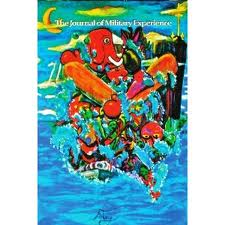
It came in the mail, a book from a professor at Eastern Kentucky University, The Journal of Military Experience. Most publications I get from universities are on topics that deal with academia, you know – ways to teach literacy, how the brain works, and other research topics. This book was different. It wasn’t written by a bunch of stuffy professors based on their special investigative studies. Nope, this book was written by a group of young veterans who had served overseas and were trying to reintegrate into civilian and academic life. Needless to say, many of the stories and poems were composed with emotions that were still raw from combat.
The authors were students in Professor Travis Martin’s writing class. The purpose of his unique course was to help with the initial assimilation phase of university life. “Some of the authors write about the unspeakable things that they have been asked to do, or more accurately, that have been done to them. But some focus solely on that work of translation, making sense of a warrior culture and the mentality of an individual who has been bred, trained, and conditioned by a society in desperate need of a few willing to sacrifice for the many (Introduction).”
The theme in many pieces confirmed how challenging returning from war was for these young warriors. They wrote about who they were before combat and how they had changed from the experience. How seeing friends die before their eyes, how being shot at on a regular basis, how tough it was to determine who would live or perish depending on their interpretation of an approaching car or a family on the side of the road, how these battle experiences made their time during and after conflict more demanding. One marine described “every day someone else would die or get seriously injured. One of my friends lost his legs from a roadside bomb right outside our front gate at 0200 in the morning (Guy Robert Lubin, p. 6-7)”.
Yet, in spite of all of the horror, all the wounds both physical and emotional, not one individual regretted serving his country. Not one person wished he/she did not complete a tour of duty overseas. What some did question, though, was when or if they would ever be free from the fiends of warfare. One author acknowledged “you truly stop caring. You don’t want to shoot, but you will. You won’t think about it, until you get home that is (Bradley Johnson, p. 53)”. He continued, “While you fight and suffer and struggle, you are also changing, becoming someone totally different. The harsh and violent realities of war forces you to change. Emotions are an inconvenience — they distract you — making you feel and think instead of react. A distracted soldier is a dead soldier. My evolution was a great thing on the battlefield, but it is just as much a bad thing when you get home (p. 53)”.
In this book, there are profound words and stories from those few who have given so much for freedom in our country and lands far away. They are “living stories” from real warriors. They ask nothing but a smidgen of understanding and a bit of healing when they return. For every vet past, present or future let us value the sacrifice and honor the service never failing to remember how all gave some, while some gave all.


